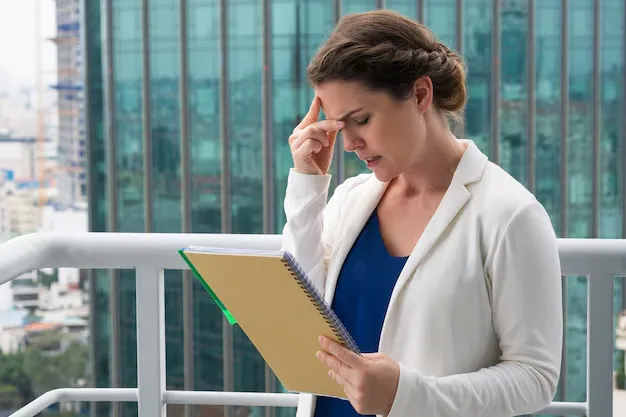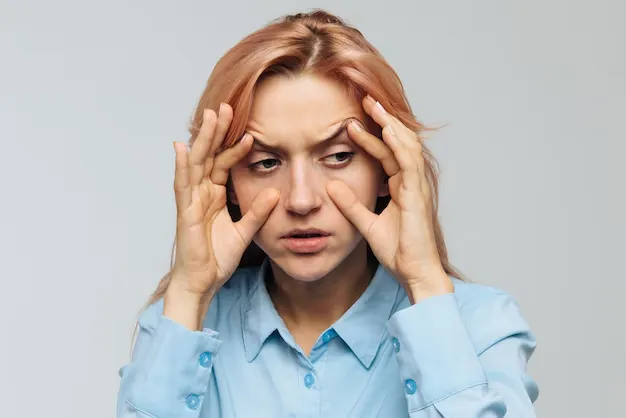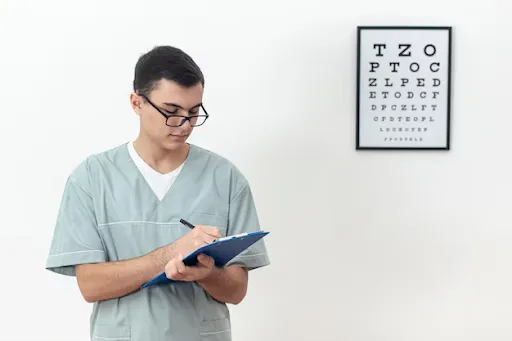Stress and Eye Health
How Stress and Anxiety Impact Eye Health
FSDAVCFEBFEVSDDVFSD
FSDAVCFEBFEVSDDVFSD
FSDAVCFEBFEVSDDVFSD
The Link Between Stress and Vision
Chronic stress and anxiety can have a notable impact on vision and eye comfort. The body's fight-or-flight response during prolonged stress leads to increased muscle tension, eye strain, and difficulty focusing. Symptoms such as eye twitching, light sensitivity, or temporary blurred vision often arise from stress-induced muscle fatigue, affecting visual clarity and comfort.
Stress also disrupts the natural tear production process, resulting in dry eye syndrome. Insufficient or poor-quality tears can lead to redness, irritation, and discomfort. Effectively managing stress through relaxation techniques, adequate sleep, and regular exercise can alleviate these symptoms, supporting overall eye health and preventing further strain.
Chronic stress and anxiety can have a notable impact on vision and eye comfort. The body's fight-or-flight response during prolonged stress leads to increased muscle tension, eye strain, and difficulty focusing. Symptoms such as eye twitching, light sensitivity, or temporary blurred vision often arise from stress-induced muscle fatigue, affecting visual clarity and comfort.

Stress also disrupts the natural tear production process, resulting in dry eye syndrome. Insufficient or poor-quality tears can lead to redness, irritation, and discomfort. Effectively managing stress through relaxation techniques, adequate sleep, and regular exercise can alleviate these symptoms, supporting overall eye health and preventing further strain.

Common Vision Problems Linked to Stress
Prolonged stress and anxiety can have a significant impact on vision, leading to various discomforts and vision-related issues. One common symptom is eye twitching, characterized by involuntary spasms in the eyelid muscles caused by stress and fatigue. These spasms, while often harmless, can become persistent and disruptive. Another frequent issue is blurred vision, as stress affects the eyes' ability to focus, leading to temporary moments of unclear sight that can hinder daily activities.
Light sensitivity is another symptom associated with stress, where tension and anxiety heighten sensitivity to bright lights. This condition can make it challenging to function in well-lit environments or spend extended periods outdoors. Chronic stress also disrupts the body’s natural tear production, often causing dry eye syndrome. This results in eyes feeling dry, irritated, and prone to redness, further affecting comfort and visual clarity.
When stress levels remain elevated, these symptoms may worsen and interfere with quality of life. It is important to address these signs promptly to prevent long-term complications. Scheduling regular comprehensive eye exams is essential to determine whether stress is the primary cause or if an underlying eye condition requires attention. Early intervention, combined with effective stress management, can help protect vision and maintain overall eye health.
How Anxiety Affects Eye Function

Anxiety doesn’t just affect mental well-being; it also has direct physical effects on vision. When anxiety triggers a rise in blood pressure and adrenaline levels, the body enters a heightened state of alertness. One noticeable impact is pupil dilation, which can make it difficult for the eyes to adjust between light and dark environments. This often causes vision to feel strained or unnatural, leaving individuals uncomfortable in changing lighting conditions.
The constant tension associated with anxiety can further strain the eye muscles, contributing to symptoms like blurry vision or a sense of visual fatigue.

While these effects are typically temporary, prolonged anxiety episodes can intensify these symptoms, disrupting daily life. Addressing anxiety through relaxation techniques and consulting a healthcare professional can help alleviate these physical effects, ensuring better eye comfort and overall vision health. Regular eye exams can also identify any underlying issues.
Anxiety can lead to various vision-related issues, including visual snow syndrome, a condition where individuals see static-like disturbances, similar to a flickering TV screen. While not physically harmful, this phenomenon can be unsettling, especially when paired with other symptoms like light sensitivity, afterimages, or difficulty focusing. These visual irregularities often become more noticeable during periods of heightened stress or anxiety, further exacerbating discomfort. Such disturbances may also disrupt daily activities, making tasks like reading, driving, or using screens more challenging.
Persistent visual disturbances should not be ignored, as they could be linked to anxiety, digital eye strain, or another underlying issue. Scheduling a professional eye exam can help identify the root cause and provide appropriate solutions. Kleinwood Vision specializes in digital eye strain solutions, which may alleviate symptoms and support overall visual health. Alongside stress management strategies, addressing vision problems early can help restore clarity and reduce the impact of these symptoms on daily life. Whether through lifestyle adjustments, stress reduction, or tailored eye care treatments, taking proactive steps ensures long-term comfort and optimal eye function. Don’t let stress affect your vision seek professional guidance to maintain clear and healthy sight.
Reducing Stress-Related Eye Problems
Managing stress is essential for maintaining eye health and preventing its adverse effects on vision. Incorporating eye relaxation techniques such as blinking exercises, palming, and following the 20-20-20 rule (looking at an object 20 feet away for 20 seconds every 20 minutes) can significantly reduce tension and alleviate strain. These simple habits help refresh the eyes, especially during prolonged screen time or tasks requiring intense focus. Additionally, practicing deep breathing and meditation lowers stress hormone levels, promoting overall relaxation and reducing vision strain caused by anxiety.
Ensuring adequate sleep and staying hydrated are also critical for eye health. Poor sleep can worsen eye fatigue, while dehydration can contribute to dryness and discomfort. Prioritizing rest and water intake helps maintain optimal tear production and reduces the risk of irritation. If symptoms persist despite these measures, consulting a professional for dry eye relief treatments can provide tailored solutions to soothe discomfort and support long-term eye health.
When to See an Eye Doctor
Stress-related vision problems often improve with relaxation techniques and self-care. However, persistent or severe symptoms may point to an underlying eye condition requiring professional attention. It’s important to monitor your vision closely and take action if discomfort persists despite your efforts to manage stress.
Some signs warranting a visit to an eye doctor include persistent blurred vision that doesn’t improve with rest, frequent eye pain or a feeling of pressure, and ongoing dryness despite using artificial tears.

Stress-related vision problems often improve with relaxation techniques and self-care. However, persistent or severe symptoms may point to an underlying eye condition requiring professional attention. It’s important to monitor your vision closely and take action if discomfort persists despite your efforts to manage stress.
Some signs warranting a visit to an eye doctor include persistent blurred vision that doesn’t improve with rest, frequent eye pain or a feeling of pressure, and ongoing dryness despite using artificial tears. Sudden changes in vision, such as the appearance of floaters or flashes of light, should also be evaluated promptly to ensure timely intervention.
Scheduling a comprehensive eye exam can help identify the root cause of these symptoms. Professional care ensures that serious conditions are ruled out, and appropriate treatment options are provided to protect and maintain your vision.
Sudden changes in vision, such as the appearance of floaters or flashes of light, should also be evaluated promptly to ensure timely intervention.
Scheduling a comprehensive eye exam can help identify the root cause of these symptoms. Professional care ensures that serious conditions are ruled out, and appropriate treatment options are provided to protect and maintain your vision.
Protecting Your Vision from Stress
Stress can significantly affect eye health, making it essential to adopt preventive measures to safeguard your vision. Taking regular screen breaks is one of the simplest yet most effective ways to reduce digital eye strain. Follow the 20-20-20 rule by looking at an object 20 feet away for 20 seconds every 20 minutes while working on digital devices. This reduces strain on your eyes and helps maintain focus over prolonged periods.
A balanced diet plays a crucial role in supporting eye health. Nutrients like omega-3 fatty acids, found in foods such as salmon, walnuts, and flaxseeds, can reduce inflammation and support tear production, alleviating dry eye symptoms. Including leafy greens, carrots, and citrus fruits in your meals further strengthens your eyes, thanks to their high vitamin content.
For those who experience dryness, using lubricating eye drops can provide immediate relief and prevent discomfort caused by insufficient tear production. It's especially helpful for individuals exposed to air-conditioned environments or prolonged screen use. Over-the-counter options are widely available, but consult an eye care professional if symptoms persist.
Regular eye check-ups are essential for monitoring your vision and detecting early signs of stress-related or underlying conditions. Routine visits allow for timely interventions, ensuring your eyes remain healthy. Managing stress is equally vital; incorporating relaxation techniques, exercise, and mindfulness can improve both mental and visual health. By adopting these small but impactful lifestyle changes, you can keep your vision clear and comfortable while mitigating the effects of stress.
Taking Care of Your Eyes Daily

Simple daily habits can significantly protect your eyes from the effects of stress and anxiety. Using blue light filters on devices helps reduce screen glare and minimizes digital eye strain, especially during prolonged screen time. Following the 20-20-20 rule can further ease eye tension and maintain focus throughout the day.
Staying hydrated is another essential habit. Drinking enough water keeps your eyes moisturized, preventing dryness and irritation caused by dehydration. Combine this with a diet rich in eye-friendly nutrients like omega-3s to further enhance eye health and reduce stress-related discomfort.
Simple daily habits can significantly protect your eyes from the effects of stress and anxiety. Using blue light filters on devices helps reduce screen glare and minimizes digital eye strain, especially during prolonged screen time. Following the 20-20-20 rule can further ease eye tension and maintain focus throughout the day.
Staying hydrated is another essential habit. Drinking enough water keeps your eyes moisturized, preventing dryness and irritation caused by dehydration. Combine this with a diet rich in eye-friendly nutrients like omega-3s to further enhance eye health and reduce stress-related discomfort.
Routine eye check-ups are key to identifying and addressing any stress-related vision issues early. Early detection allows for timely interventions, preventing minor problems from worsening. By prioritizing eye care and managing stress, you can preserve your vision. If persistent symptoms arise, consult an eye care professional for expert advice and tailored solutions.
Routine eye check-ups are key to identifying and addressing any stress-related vision issues early. Early detection allows for timely interventions, preventing minor problems from worsening. By prioritizing eye care and managing stress, you can preserve your vision. If persistent symptoms arise, consult an eye care professional for expert advice and tailored solutions.
Final Thoughts on Stress and Vision
Stress and anxiety can significantly affect eye health, leading to discomfort such as dryness, strain, and vision disturbances. These symptoms often occur due to prolonged screen time, lack of sleep, or heightened stress levels, which can disrupt the natural lubrication and focus of the eyes. While many of these issues are temporary, persistent discomfort may indicate underlying conditions that require professional attention.
If you’re experiencing ongoing symptoms like eye strain, dryness, or blurred vision, it’s crucial to seek professional advice. Regular eye exams not only address these concerns but also help maintain overall eye health and prevent potential complications. Don’t let stress take a toll on your vision schedule and eye exam today. Contact us to book your appointment and ensure your eyes stay healthy and stress-free. Taking this proactive step can make a significant difference in your comfort and clarity.

Contact Info
Hours of Operation
Mon - Fri | 9:00 AM - 5:00 PM
Sat - Sun | Closed
Holiday Hours: We are closed for the following holidays: New Years Day, Memorial Day, Independence Day, Labor Day, Thanksgiving Day, Christmas Day
© 2026 Kleinwood Vision. All rights Reserved.


